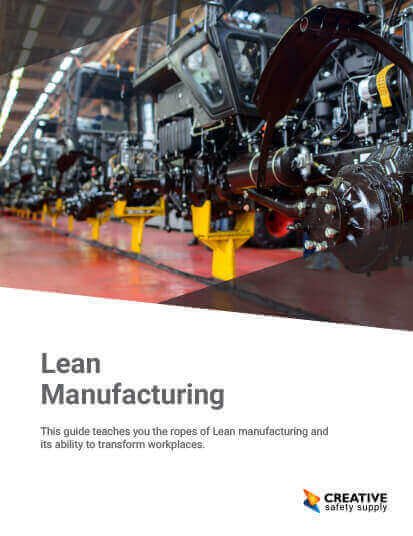
How does Lean Manufacturing improve quality?
Lean manufacturing is a fundamental methodology applied in the manufacturing industry and beyond; its proven benefits have encouraged companies in fields like healthcare and finance to adopt it, as well. It’s a production improvement strategy that aims to boost customer value by eliminating waste and streamlining work processes.
But how is Lean manufacturing used today to improve quality? There are many ways to implement it, including the 5S methodology. Generally, the key principles of the technique themselves, augmented by different tools, enable businesses to improve productivity, reduce defects, and streamline workflows, which all-in-all contribute to better quality outputs.
What Is Lean Manufacturing?
Lean manufacturing is a production organization technique that’s founded on getting rid of waste, whether that’s space, resources, activity, or people. It was founded by the Toyota Production System (TPS), which is known to have successfully implemented it to achieve worldwide expansion and recognition.
Lean manufacturing is grounded on five principles:
- Identifying value: Determining what customers deem as ‘valuable,’ and how much they are willing to pay for a product or service
- Mapping the value stream: Reducing waste in the product life cycle
- Creating flow: Making workflows and processes more seamless
- Establishing pull: Operating on a demand-based system
- Pursuing perfection: Striving to be better every day
The Eight Wastes in Lean Manufacturing
Lean manufacturing boosts consistency primarily by reducing waste. But what does the framework define as ‘waste’ anyway? Here’s a quick overview of the eight (previously seven) wastes in Lean manufacturing:
- Overproduction: Producing outputs that don’t coincide with demand
- Excess Inventory: Overstocking materials and resources
- Unnecessary Motion: People or equipment moving unnecessarily
- Defects: Creating products or services that are unfit for use and require rework or scrapping
- Overprocessing: Working in excess or taking on unnecessary tasks
- Waiting: Idling, whether pertains to equipment, materials, people, or workflows
- Unnecessary Transport: Moving resources excessively
- Unused Talent: Wasting skills or potential of manpower
How Lean Manufacturing Improves Quality
Lean manufacturing improves quality by eliminating waste, which consequently improves production, increases human efficiency, and reduces costs. With more streamlined workflows and motivated employees, plus fewer blocks in the process and reduced unnecessary movement, work, or resources, companies can focus on delivering higher customer value and shift their efforts toward product innovation.
Tips for Implementing Lean Manufacturing
Here are some tips to help you properly employ the methodology in your company’s day-to-day activities:
Review Your Processes
Lean manufacturing can be applied to various parts of a company’s systems and workflows. To determine where you can improve, you must first pinpoint where there is waste in what you do. Take a closer look into your processes to see what can be changed, enhanced, or removed.
Use a Mix of Tools
Lean manufacturing can be implemented using different sub-variations, tools, and techniques, including:
- 5S methodology
- Control charts
- Kanban boards
- Poka-yoke (error-proofing)
- Single-point scheduling
- Value stream mapping
- Work cell redesign
- Lean Six Sigma
- Rank order clustering
It’s best to take a look into how each one functions, then determine which approach will work best for your company.
Keep Improving
The fifth tenet of Lean manufacturing is ‘Kaizen’ or the pursuit of perfection. This entails an ongoing effort for improvement, which involves proactively looking for aspects to refine and figuring out ways to make systems even more efficient (e.g. by using new technologies or following industry trends).
Get Your Staff on the Same Page
The benefits of Lean manufacturing can only be maximized if the whole company is on the same page when it comes to waste elimination. Actively engage your employees to live by the methodology’s principles and encourage them to adopt a more problem-solving mindset.
Boosting Consistency and Improving Quality with Creative Safety Supply
Creative Safety Supply is dedicated to helping businesses boost their productivity and produce better-quality outputs. It does this by being grounded on Lean manufacturing, particularly the 5S methodology, and providing companies with the tools they need to adopt these techniques. Learn more about Lean manufacturing and how Creative Safety Supply can help you today!
Similar Questions
- What does Lean Manufacturing consist of?
- What are the benefits of Lean Manufacturing?
- How is Lean Manufacturing used today?
- Is Lean Six Sigma useful?
- How do I learn Lean Manufacturing?
- What is the difference between Lean Manufacturing and Six Sigma?
- How can Lean affect the supply chain?
- What’s the difference between Traditional and Lean Manufacturing?
- What are some Examples of Lean Manufacturing From Leading Companies?

